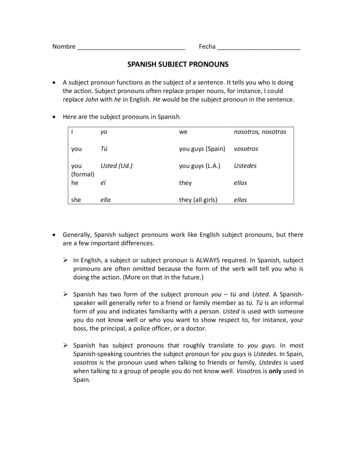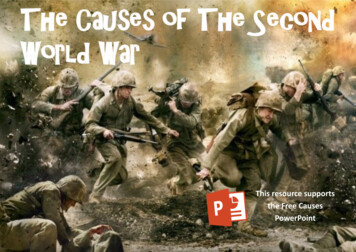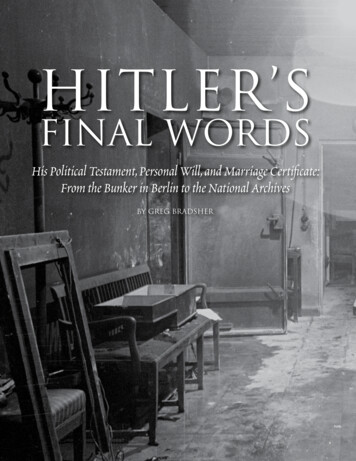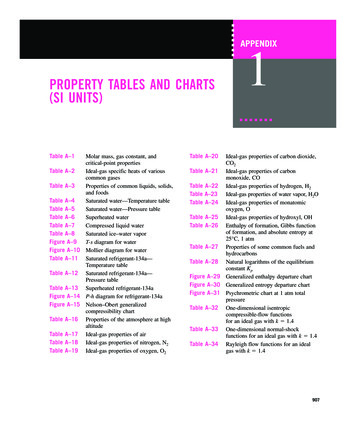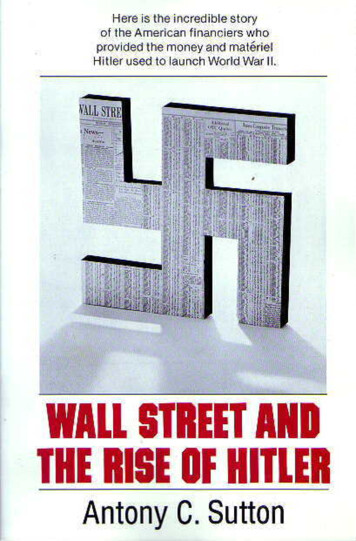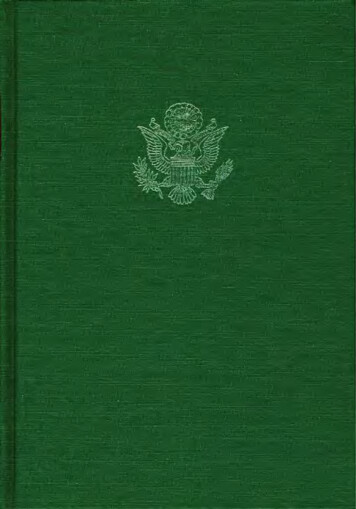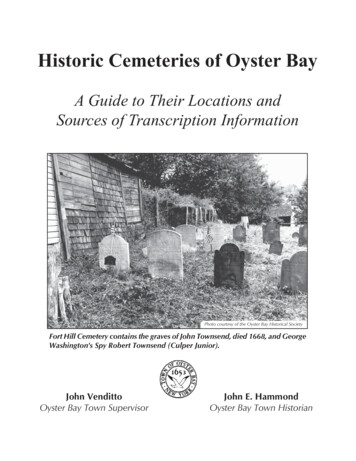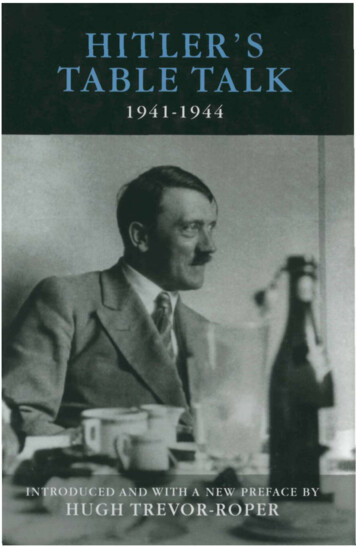
Transcription
HITLER'S TABLE TALK,1941-1944His Private Conversations
HITLER'S TABLE TALK1941-1944His Private ConversationsTranslated byNorman Cameron and R.H. StevensIntroduced and with a new Preface byH.R. Trevor-RoperenigmabooksNEW YORK CITY
Hitler's Table Talk 1941-1944Introduction and Preface by Hugh Trevor-RoperCopyright Enigma Books 2000First published in Great Britainby Weidenfeld & Nicolson Ltd, Londona division of the Orion Publishing CompanyIntroductory Essay 'The Mind of Hitler'and Preface 2000 by H.R. Trevor-RoperEnglish translation copyright 1953by Weidenfeld and NicolsonThe moral right of H.R. Trevor-Roper to be identifiedas the author of the introductory essay 'The Mind of Hitler'and the Preface has been asserted by him in accordance withthe Copyright, Designs and Patents Act 1988.All rights reserved under Internationaland Pan-American Copyright Conventions.Published in the United States by Enigma Books, Inc.580 Eighth Avenue, New York, NY 10018www.enigmabooks.comSecond PrintingPrinted and bound in CanadaISBN 1-929631-05-7
CONTENTSINTRODUCTION BY H. R. TREVOR-ROPERPreface to third editionviiThe Mind of Adolf HitlerxiPART ONE5th July—31st December194119421stPART TWOJanuary—5th Februaryi1611942PART THREE6th February—7th September2971943PART FOUR13th June—24th June7011944PART FIVE13th March—29th-30th November713INDEX723
PART ONE19415th July—31st December
3ISaturday, 5th July 1941Aryans and Russians—Necessity of the mailed fist inRussia—Deterioration of soil.What we need is a collective view of people's wish to live andmanner of living.We must distinguish between the Fascist popular movementand the popular movement in Russia. The Fascist movement isa spontaneous return to the traditions of ancient Rome. TheRussian movement has an essential tendency towards anarchy.By instinct, the Russian does not incline towards a higherform of society. Certain peoples can live in such a way thatwith them a collection of family units does not make a whole;and although Russia has set up a social system which, judgedby Western standards, qualifies for the designation " State ", itis not, in fact, a system which is either congenial or natural to her.It is true that, in a sense, every product of human culture,every work gifted with beauty can be born only of the effect ofthe constraint which we call education.The Aryan peoples are peoples who are particularly active.A man like Krümel works from morning to night; such-andsuch another person never stops thinking. In the same way, theItalian is as diligent as an ant (bienenfleissig). In the eyes of theRussian, the principal support of civilisation is vodka. His idealconsists in never doing anything but the indispensable. Our conception of work (work, and then more of it!) is one that he submits to as if it were a real curse.It is doubtful whether anything at all can be done in Russiawithout the help of the Orthodox priest. It's the priest who hasbeen able to reconcile the Russian to the fatal necessity of work—by promising him more happiness in another world.The Russian will never make up his mind to work exceptunder compulsion from outside, for he is incapable of organisinghimself. And if, despite everything, he is apt to have organisation thrust upon him, that is thanks to the drop of Aryan bloodin his veins. It's only because of this drop that the Russianpeople has created something and possesses an organised State,It takes energy to rule Russia. The corollary is that, the
4COAL AND P E T R O L E U M R E S E R V E Stougher a country's régime, the more appropriate it is thatequity and justice should be practised there. The horse that isnot kept constantly under control forgets in the wink of an eyethe rudiments of training that have been inculcated into it. Inthe same way, with the Russian, there is an instinctive force thatinvariably leads him back to the state of nature. People sometimes quote the case of the horses that escaped from a ranch inAmerica, and by some ten years later had formed huge herds ofwild horses. It is so easy for an animal to go back to its origins !For the Russian, the return to the state of nature is a return toprimitive forms of life. The family exists, the female looks afterher children, like the female of the hare, with all the feelingsof a mother. But the Russian doesn't want anything more. Hisreaction against the constraint of the organised State (which isalways a constraint, since it limits the liberty of the individual) isbrutal and savage, like all feminine reactions. When he collapsesand should yield, the Russian bursts into lamentations. This willto return to the state of nature is exhibited in his revolutions.For the Russian, the typical form of revolution is nihilism.I think there's still petroleum in thousands of places. As forcoal, we know we're reducing the natural reserves, and that inso doing we are creating gaps in the sub-soil. But as forpetroleum, it may be that the lakes from which we are drawingare constantly renewed from invisible reservoirs.Without doubt, man is the most dangerous microbe imaginable. He exploits the ground beneath his feet without everasking whether he is disposing thus of products that would perhaps be indispensable to the life of other regions. If oneexamined the problem closely, one would probably find herethe origin of the catastrophes that occur periodically in theearth's surface.2Night of 5th-6th July 1941, 11.30 p.m.-i.so a.m.The shortening of space by roads—The frontier of theUrals—Moscow must disappear—The treasures of theHermitage.The beauties of the Crimea, which we shall make accessibleby means of an autobahn—for us Germans, that will be our
H O L I D A Y S IN THE NEW E U R O P E5Riviera. Crete is scorching and dry. Cyprus would be lovely,but we can reach the Crimea by road. Along that road liesKiev! And Croatia, too, a tourists' paradise for us. I expectthat after the war there will be a great upsurge of rejoicing.Better than the railway, which has something impersonalabout it, it's the road that will bring peoples together. Whatprogress in the direction of the New Europe! Just as the autobahn has caused the inner frontiers of Germany to disappear,so it will abolish the frontiers of the countries of Europe.To those who ask me whether it will be enough to reach theUrals as a frontier, I reply that for the present it is enough forthe frontier to be drawn back as far as that. What matters isthat Bolshevism must be exterminated. In case of necessity, weshall renew our advance wherever a new centre of resistance isformed. Moscow, as the centre of the doctrine, must disappearfrom the earth's surface, as soon as its riches have been broughtto shelter. There's no question of our collaborating with theMuscovite proletariat. Anyhow, St. Petersburg, as a city, isincomparably more beautiful than Moscow.Probably the treasures of the Hermitage have not beenstored at the Kremlin, as they were during the first World War,but in the country-houses—unless they've been shifted to thecities east of Moscow, or still further by river.3Night of 11 th-12 th July 1941The natural piety of man—Russian atheists know how todie—No atheistical education.I think the man who contemplates the universe with his eyeswide open is the man with the greatest amount of natural piety:not in the religious sense, but in the sense of an intimateharmony with things.At the end of the last century the progress of science andtechnique led liberalism astray into proclaiming man's masteryof nature, and announcing that he would soon have dominionover space. But a simple storm is enough—and everythingcollapses like a pack of cards!In any case, we shall learn to become familiar with the lawsby which life is governed, and acquaintance with the laws of
THE NATURE OF GODnature will guide us on the path of progress. As for the why ofthese laws, we shall never know anything about it. A thing is so,and our understanding cannot conceive of other schemes.Man has discovered in nature the wonderful notion of thatall-mighty being whose law he worships.Fundamentally in everyone there is the feeling for this allmighty, which we call God (that is to say, the dominion ofnatural laws throughout the whole universe). The priests, whohave always succeeded in exploiting this feeling, threatenpunishments for the man who refuses to accept the creed theyimpose.When one provokes in a child a fear of the dark, one awakensin him a feeling of atavistic dread. Thus this child will be ruledall his life by this dread, whereas another child, who has beenintelligently brought up, will be free of it.It's said that every man needs a refuge where he can findconsolation and help in unhappiness. I don't believe it! Ifhumanity follows that path, it's solely a matter of tradition andhabit. That's a lesson, by the way, that can be drawn from theBolshevik front. The Russians have no God, and that doesn'tprevent them from being able to face death.We don't want to educate anyone in atheism.4Nightofii th- is th July 1941National Socialism and religion cannot exist together—Nopersecution of religions, let them wither of themselves—Bolshevism, the illegitimate child of Christianity—Origin ofthe Spartan gruel—The Latvian morons—Stalin, one ofhistory's most remarkable figures.When National Socialism has ruled long enough, it will nolonger be possible to conceive of a form of life different fromours.In the long run, National Socialism and religion will nolonger be able to exist together.On a question from C. S., whether this antagonism might mean awar, the Fuehrer continued:No, it does not mean a war. The ideal solution would be toleave the religions to devour themselves, without persecutions.
CHRISTIANITY,ISLAM,ROMANEMPIREJBut in that case we must not replace the Church by somethingequivalent. That would be terrifying! It goes without sayingthat the whole thing needs a lot of thought. Everything willoccur in due time. It is a simple question of honesty, that's whatit will finally boil down to.In England, the status of the individual in relation to theChurch is governed by considerations of State. In America, it'sall purely a matter of conformism.The German people's especial quality is patience; and it's theonly one of the peoples capable of undertaking a revolution inthis sphere. It could do it, if only for the reason that only theGerman people has made moral law the governing principle ofaction.The heaviest blow that ever struck humanity was the comingof Christianity. Bolshevism is Christianity's illegitimate child.Both are inventions of the Jew. The deliberate lie in the matterof religion was introduced into the world by Christianity.Bolshevism practises a lie of the same nature, when it claims tobring liberty to men, whereas in reality it seeks only to enslavethem. In the ancient world, the relations between men andgods were founded on an instinctive respect. It was a world enlightened by the idea of tolerance. Christianity was the firstcreed in the world to exterminate its adversaries in the name oflove. Its key-note is intolerance.Without Christianity, we should not have had Islam. TheRoman Empire, under Germanic influence, would havedeveloped in the direction of world-domination, and humanitywould not have extinguished fifteen centuries of civilisation at asingle stroke.Let it not be said that Christianity brought man the life ofthe soul, for that evolution was in the natural order of things.The result of the collapse of the Roman Empire was a nightthat lasted for centuries.The Romans had no dislike of the Germans. This is shown bythe mere fact that blond hair was fashionable with them.Amongst the Goths there were many men with dark hair.The Italian, Spanish, French and English dialects werecreated by mixtures of local languages with the linguistic
8STALIN'S BUREAUCRATIC GOVERNMENTelements imported by the migrant peoples. At first they weremere vernaculars, until a poet was found who forged thenation's language. It takes five or six centuries for a languageto be born.The conqueror of a country is forced to adapt himself to thelocal language. That is why language is not the immovablemonument on which a people's characteristics are inscribed. Apeople's way of eating, for example, is racially more typical—for every man remains persuaded in his heart that his mother isthe best cook. When I tasted the soup of the people of SchleswigHolstein, it occurred to me that the gruel of the Spartanscannot have been very different. In the time of the greatmigrations, the tribes were the product of ceaseless mixtures.The men who arrived in the South were not the same as thosewho went away. One can imagine two hundred youngFriesians setting out for the South, like a tank setting outacross country, and carrying with them men belonging to othertribes. The Groats are certainly more Germanic than Slav.The Esthonians, too, have a lot of Germanic blood.The Esthonians are the élite of the Baltic peoples. Thencome the Lithuanians, and lastly the Latvians. Stalin usedLatvians for the executions which the Russians found disgusting.They're the same people who used to have the job of executionersin the old empire of the Tsars.Stalin is one of the most extraordinary figures in worldhistory. He began as a small clerk, and he has never stoppedbeing a clerk. Stalin owes nothing to rhetoric. He governsfrom his office, thanks to a bureaucracy that obeys his every nodand gesture.It's striking that Russian propaganda, in the criticisms itmakes of us, always holds itself within certain limits. Stalin,that cunning Caucasian, is apparently quite ready to abandonEuropean Russia, if he thinks that a failure to solve her problemswould cause him to lose everything. Let nobody think Stalinmight reconquer Europe from the Urals! It is as if I were installed in Slovakia, and could set out from there and reconquerthe Reich. This is the catastrophe that will cause the loss of theSoviet Empire.
L U T H E R , D A N T E AND M U S S O L I N I59Night of 21st-22nd July 1941Gratitude to the Jesuits—Protestant fanaticism—Similarities between Germany and Italy—Dante and Luther—TheDuce is one of the Caesars—The march on Rome—a turningpoint in history—Delightful Italian towns—Rome and Paris.When all's said, we should be grateful to the Jesuits. Whoknows if, but for them, we might have abandoned Gothicarchitecture for the light, airy, bright architecture of theCounter-Reformation? In the face of Luther's efforts to lead anupper clergy that had acquired profane habits back to mysticism, the Jesuits restored to the world the joy of the senses.It's certain that Luther had no desire to mould humanity tothe letter of the Scriptures. He has a whole series of reflectionsin which he clearly sets himself against the Bible. He recognisesthat it contains a lot of bad things.Fanaticism is a matter of climate—for Protestantism, too, hasburnt its witches. Nothing ofthat sort in Italy, The Southernerhas a lighter attitude towards matters of faith. The Frenchmanhas personally an easy way of behaving in his churches. Withus, it's enough not to kneel to attract attention.But Luther had the merit of rising against the Pope and theorganisation of the Church. It was the first of the great revolutions. And thanks to his translation of the Bible, Luther replaced our dialects by the great German language!It's remarkable to observe the resemblances between theevolution of Germany and that of Italy. The creators of thelanguage, Dante and Luther, rose against the oecumenicaldesires of the papacy.Each of the two nations was led to unity, against the dynasticinterests, by one man. They achieved their unity against the willof the Pope.I must say, I always enjoy meeting the Duce. He's a greatpersonality. It's curious to think that, at the same period asmyself, he was working in the building trade in Germany. Ourprogramme was worked out in 1919, and at that time I knewnothing about him. Our doctrines are based on the foundations
IOART T R E A S U R E S IN E U R O P E A N CITIESproper to each of them, but every man's way of thinking is aresult. Don't suppose that events in Italy had no influence onus. The brown shirt would probably not have existed withoutthe black shirt. The march on Rome, in 1922, was one of theturning-points of history. The mere fact that anything of thesort could be attempted, and could succeed, gave us an impetus. A few weeks after the march on Rome, I was received bythe Minister Schweyer. That would never have happenedotherwise.If Mussolini had been outdistanced by Marxism, I don'tknow whether we could have succeeded in holding out. At thatperiod National Socialism was a very fragile growth.If the Duce were to die, it would be a great misfortune forItaly. As I walked with him in the gardens of the Villa Borghese, I could easily compare his profile with that of the Romanbusts, and I realised he was one of the Caesars. There's nodoubt at all that Mussolini is the heir of the great men of thatperiod.Despite their weaknesses, the Italians have so many qualitiesthat make us like them.Italy is the country where intelligence created the notion ofthe State. The Roman Empire is a great political creation, thegreatest of all.The Italian people's musical sense, its liking for harmoniousproportions, the beauty of its race! The Renaissance was thedawn of a new era, in which Aryan man found himself anew.There's also our own past on Italian soil. A man who is indifferent to history is a man without hearing, without sight.Such a man can live, of course—but what a life?The magic of Florence and Rome, of Ravenna, Siena,Perugia! Tuscany and Umbria, how lovely they are!The smallest palazzo in Florence or Rome is worth more thanall Windsor Castle. If the English destroy anything in Florenceor Rome, it will be a crime. In Moscow, it wouldn't do anygreat harm; nor in Berlin, unfortunately.I've seen Rome and Paris, and I must say that Paris, with theexception of the Arc de Triomphe, has nothing on the scale ofthe Coliseum, or the Castle of San Angelo, or St. Peter's. Thesemonuments, which are the product of a collective effort, have
WISH TO W A N D E R AS P A I N T E R IN ITALY11ceased to be on the scale of the individual. There's somethingqueer about the Paris buildings, whether it's those bull's-eyewindows, so badly proportioned, or those gables that obliteratewhole façades. If I compare the Pantheon in Rome with thePantheon in Paris, what a poor building—and what sculptures !What I saw in Paris has disappeared from my memory : Romereally seized hold of me.When the Duce came to Berlin, we gave him a magnificentreception. But our journey in Italy, that was something else!The reception when we arrived, with all the ceremonial. Thevisit to the Quirinal.Naples, apart from the castle, might be anywhere in SouthAmerica. But there's always the courtyard of the royal palace.What nobility of proportions !My dearest wish would be to be able to wander about in Italyas an unknown painter.6Night of the 22nd-23rd July 1941British arrogance—The birth of German industry—Tradecompetition with Britain—Steps towards a durable understanding between Germany and Britain—Dearth ofphilosophic and artistic sense of the British.The Englishman is superior to the German in one respect—that of pride. Only the man who knows how to give orders haspride.Everywhere in the world, Germans are working without getting the wages they deserve. Their abilities are recognised, butthe fact that they live solely by their work makes them an objectof contempt to the people whom they enrich.That's the reason why, in the period just before the firstWorld War, the German got so little sympathy in the AngloSaxon world.Around 1870 we had a huge excess population, with theresult that every year between two and three hundred thousandof our people had to make up their minds to emigrate. Theremedy for this state of affairs would have been to incorporatethem in the labour cycle. The only form of production thatcould be considered was that of the German primary materials
12F R I E N D S H I P WITH E N G L A N D—coal and steel. In this field, the needs of the market had untilthen been covered by England. The English demanded thebest, and paid high prices to get it. In these conditions, anyonewho wants nevertheless to do business has only one solution—toask lower prices.Our desperation for work enabled us to produce cheap, massproduced articles that could nevertheless compete with Englishgoods on the quality level. We were beginners, and did notknow all the secrets of manufacture. Thus it was that during the'eighties, at a World Exhibition in Philadelphia, German production was called "shoddy". Nevertheless, with time, we wereable to out-class English work in three sectors of production :the chemical industry (especially as regards pharmaceuticalproducts, the manufacture of dyes and, just before the firstWorld War, the extraction of nitrogen from the air) ; the production of electrical apparatus; and the production of opticalinstruments.England felt this competition so keenly that she reacted withall her strength. But neither her attempts at tariff protection,nor certain international agreements, nor the compulsory use ofthe phrase "Made in Germany" as a label for our goods, madeany difference at all.For the English, the ideal existence was represented in thesociety of the Victorian age. At that time England had at herservice the countless millions of her colonial Empire, togetherwith her own thirty-five million inhabitants. On top of that, amillion bourgeois—and, to crown the lot, thousands of gentlefolkwho, without trouble to themselves, reaped the fruit of otherpeople's toil. For this ruling caste, Germany's appearance on thescene was a disaster. As soon as we started our economic ascent,England's doom was sealed. It is quite certain that in futureEngland's Empire won't be able to exist without the support ofGermany.I believe that the end of this war will mark the beginning of adurable friendship with England. But first we must give herthe k.o.—for only so can we live at peace with her, and theEnglishman can only respect someone who has first knockedhim out.The memory of 1918 must be obliterated.
VALUE OF SS ON THE HOME FRONT13G. D. asked the Fuehrer whether Germany was fortified against thedangers of over-easy living, which were threatening to be the ruin ofEngland.Yes, and that's why I pay attention to the arts. Amongst theEnglish, culture, like sport, is a privilege of good society. Justimagine, in no country is Shakespeare so badly acted as inEngland. They love music, but their love is not returned!Besides, they have no thinker of genius. What does the NationalGallery mean there, to the mass of the people? It's like theirsocial reform. It wasn't called for, like German reform, by theneeds of conscience, but solely by reasons of State.At Bayreuth one meets more Frenchmen than Englishmen.Quote me the example of a single theatre in England wherework is done that compares with the work we do in hundreds oftheatres.But I've met a lot of Englishmen and Englishwomen whom Irespect. Let's not think too much about those whom we know,with whom we've had those deceptive official dealings—they'renot men. Despite everything, it's only with the people that wecan associate.7Night of 24th-25th July 1941The qualities of the German soldier—SS losses paydividends—Weaknesses of the German High Commandin 1914-18.I can say that I've never doubted the qualities of the Germansoldier—which is more than I can say even of some of the chiefsof the Wehrmacht.The German army is technically the most perfect in theworld ; and the German soldier, in a moment of crisis, is saferand sounder than any other soldier. I'm truly happy that it hasbeen granted to me to see, in iny lifetime, the German soldierrewarded by Providence. For an élite force, like our SS, it'sgreat luck to have suffered comparatively heavy losses. In thisway, it's assured of the necessary prestige to intervene, if needbe, on the home front—which, of course, won't be necessary.But it's good to know that one disposes of a force that couldshow itself capable of doing so, on occasion.
14R U M A N I A . BRITISH-US R I V A L R I E SIt's marvellous to see how our Gauleiters are everywhere inthe breach.I cannot tell you how greatly I suffered, during the GreatWar, from the weaknesses of our command. In a military sensewe were not at all clever, and in a political sense we were soclumsy that I had a constant longing to intervene. If I'd beenReich Chancellor at the period, in three months' time I'd havecut the throat of all obstruction, and I'd have reasserted ourpower.If I were twenty to twenty-five years younger, I'd be in thefront line. I passionately loved soldiering.8Friday, 25th July 1941, middayRumania must become an agricultural country.Rumania would do well to give up, as far as possible, the ideaof having her own industry. She would direct the wealth of hersoil, and especially her wheat, towards the German market.She would receive from us, in exchange, the manufacturedgoods she needs. Bessarabia is a real granary. Thus theRumanian proletariat, which is contaminated by Bolshevism,would disappear, and the country would never lack anything.I must own that King Carol has worked in that direction.9Friday, 25th July 1941, eveningAnglo-American rivalries.England and America will one day have a war with oneanother, which will be waged with the greatest hatred imaginable. One of the two countries will have to disappear.10Saturday, 26th July 1941, nightMonarchy is doomed.The people needs a point upon which everybody's thoughtsconverge, an idol. A people that possesses a sovereign of thestature of Frederick the Great can think itself happy; but if
L E S S O N OF BRITISH R U L E IN I N D I A15he's just an average monarch, it's better to have a republic.Notice that when the institution of monarchy has beenabolished in a country—see France and Yugoslavia to-day!—thenceforward the institution is given over to ridicule, and cannever again assert itself.I am tempted to believe that the same thing will happen withthe Church. Both are institutions that naturally developed inthe direction of ceremonial and solemnity. But all thatapparatus no longer means anything when the power that laybeneath it has disappeared.IISunday, ayth July 1941, eveningOld and young nations—Never again a military power inthe East—British domination in India—No education forilliterate Russians—Colonisation of the Ukraine—Thesoldier-peasants.It is striking to observe to what a degree a people's place inthe world is a function of its age. A young nation is compelledto constant successes. An old nation can allow itself continualset-backs. Germany and England.We must take care to prevent a military power from everagain establishing itself on this side of the Urals, for our neighbours to the West would always be allied with our neighbours tothe East. That's how the French once made common cause withthe Turks, and now the English are behaving in the samefashion with the Soviets. When I say, on this side of the Urals,I mean a line running two or three hundred kilometres east ofthe Urals.It should be possible for us to control this region to the Eastwith two hundred and fifty thousand men plus a cadre Of goodadministrators. Let's learn from the English, who, with twohundred and fifty thousand men in all, including fifty thousandsoldiers, govern four hundred million Indians. This space inRussia must always be dominated by Germans.Nothing would be a worse mistake on our part than to seek toeducate the masses there. It is to our interest that the peopleshould know just enough to recognise the signs on the roads.At present they can't read, and they ought to stay like that.
l6C O L O N I S A T I O N OF RUSSIA A N D BALTIC STATESBut they must be allowed to live decently, of course, and that'salso to our interest.We'll take the southern part of the Ukraine, especially theCrimea, and make it an exclusively German colony. There'll beno harm in pushing out the population that's there now. TheGerman colonist will be the soldier-peasant, and for that I'lltake professional soldiers, whatever their line may have beenpreviously. In this way we shall dispose, moreover, of a body ofcourageous N.G.O.'s, whenever we need them. In future weshall have a standing army of a million and a half to two millionmen. With the discharge of soldiers after twelve years ofservice, we shall have thirty to forty thousand men to do whatwe like with every year. For those of them who are sons ofpeasants, the Reich will put at their disposal a completelyequipped farm. The soil costs us nothing, we have only thehouse to build. The peasant's son will already have paid for itby his twelve years' service. During the last two years he willalready be equipping himself for agriculture. One single condition will be imposed upon him: that he may not marry atownswoman, but a countrywoman who, as far as possible, willnot have begun to live in a town with him. These soldierpeasants will be given arms, so that at the slightest danger theycan be at their posts when we summon them. That's how theancient Austria used to keep its Eastern peoples under control.By the same token, the soldier-peasant will make a perfect schoolteacher. The N.C.O. is an ideal teacher for the little countryboy. In any case, this N.C.O. will make a better teacher thanour present teacher will make an officer !Thus we shall again find in the countryside the blessing ofnumerous families. Whereas the present law of rural inheritancedispossesses the younger sons, in future every peasant's son willbe sure of having his patch of ground. And thirty to fortythousand peasants a year—that's enormous !In the Baltic States, we'll be able to accept as colonists someDutch, some Norwegians—and even, by individual arrangement, some Swedes.
NATIONAL SOCIALIST TH
the constraint which we call education. The Aryan peoples are peoples who are particularly active. A man like Krümel works from morning to night; such-and-such another person never stops thinking. In the same way, the Italian is as diligent as an ant (bienenfleissig). In the eyes of the Russian, the principal support of civilisation is vodka .

